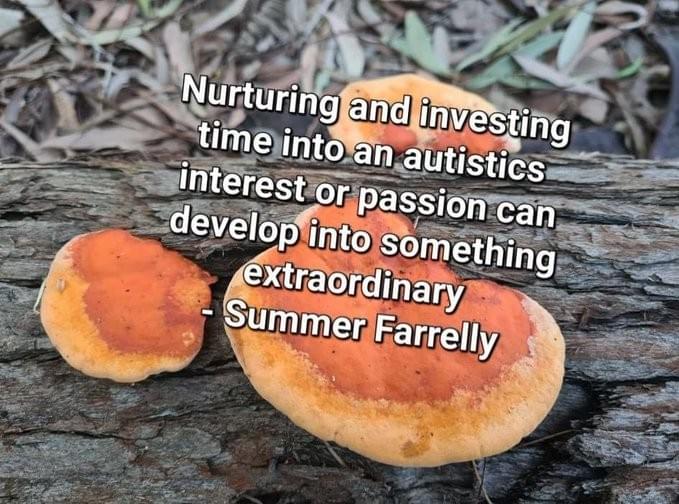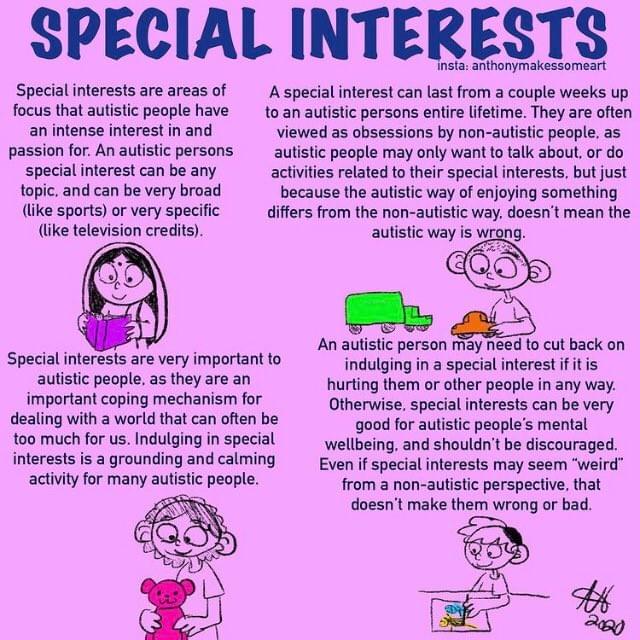
Work With, Not Against
People with what arecalled ‘special needs’ are most often people with special interests, and special talents relating to those interests. If those interests become bsessive, to the point of taking a person too far away from ‘normal’ affairs, then there may be a cause for concern and a need to monitor. It is a mistake, however, to seek to turn a person away from those special interests. Those special interests are often a way a person finds calm, meaning, and order in what is often experienced as a chaotic world. More positively, those interests can often be expansive, broadening out into a wider range of activities that takes an otherwise withdrawn person into the world around them. Further, said persons may become experts of some description, skilled in a way that people most ordinarily are not. Those special interests can be a pathway into the world and not just away from it. It all depends on how the special talents of those special people are nurtured, if they are nurtured at all.
Just be careful, though. I loved words so much I ended up writing twenty million of them. At least.
To summarize on specialinterests. Special interests are areas of focus which autistic people have an intense interest in and passion for. A special interest can be any subject or topic, and can be broad as well as specific.
I like to joke anddeflate tendencies to pomposity here, likewise assumptions of oddity. I have an interest in and passion for many things, which I have indeed taken to the nth degree. There are those who consider me a genius for the ease with which I write on a wide range of philosophers, from Plato and Aristotle to Hegel, Marx, and Wittgenstein. The world loves geniuses, and there is a temptation to consider that an autistic person with a special interest is somewhat gifted. So I love to emphasise that I am equally expert in all things Elvis, with a website devoted to the great man to boot. The intense focus and passion is exactly the same, regardless of the subject matter. I make no distinction between Kant and Elvis. I don’t consider the ability to fix and focus so intently as tantamount to genius. It’s all pretty random where the focus goes, from maths and science to crystals and witches and anything at all in between. That’s not a criticism. Life comes in all colours. People with a special interest can offer something expert and insightful with respect to some facet of life, and it is wise to see how that interest could be productively channelled, productive for society but most of all for the person.
A special interest can come and go, like a quick burst of passion, or it can last a lifetime. Such interests can be considered to be obsessions on the part of ‘normal’ people and, as such, something to be concerned about and maybe even check. The obsessive aspect of a special interest is evident in the way that an autistic person may only want to talk about certain things, always looking to bring any and every conversation back to those things. I make a joke of the way I tend to ‘Elvisize’ matters under discussion. But I have had a tendency to do the same things with other things of interest to me. Such as Françoise Hardy. Not that I would describe the ethereal Françoise as a ‘thing.’
I would do it inpolitical debates all the time, always bringing an issue back to the crises and contradictory dynamics of ‘the capital system’ (always insisting on using the term ‘the capital system’ rather than capitalism.) I’m not alone in this. I would suggest that most people in politics are obsessive in this manner, reducing any and every issue to their pet theory or cause – power, climate change, globalists, elites, populists etc. It’s like being in the presence of cultists who see God everywhere and see nothing else.
But I digress, slightly. By this digression, I hope to disabuse ‘normal’ people of the notion that only autistic people are obsessive and that their special interests are necessarily and by definition obsessive. If the interests and passions of autisic people do become obsessive, they tend to harm only themselves and not others – precisely the opposite applies to the obsessions of ‘normal’ people, particularly with respect to politics and morality (religion and surrogate religion).
If people only want totalk about or engage in activities relating to their special interest, then this can indeed give cause for concern. Life is multi-faceted and requires a range of skills and commitments. It is easy to divert creative energies into narrow and ever-narrowing endeavours, taking a person further and further away from wider society and further and further into themselves. It is easily done. I did it. And I did it in a way that looked as though I was being ‘normal’ and taking my place in the social world. I did it by way of study and education, with the courses I undertook becoming longer each time, culminating in the heads-down social shutdown of the PhD. I was allowed to continue down the tunnel precisely because it seemed that I was being productive with my special interest and that all that study and writing was leading somewhere.
The point is that the special interests that autistic people have can be productively oriented via creative channels, just as theycan divert a person into sterile channels. It was well-nigh impossible for others to detect whether my efforts over years were creative or decreative. They were rewarded with academic success, in that I passed all the exams and earned all the certificates. But that they led to nothing more than other courses and qualifications indicates the existence of a cycle that stood in need of being broken.
My advice is to look for evidence of development and progression. It’s not the special interest and the intensity of focus that is the issue but what end it serves and where, if anywhere, it goes.
That special interest doesn’t necessarily have to go anywhere externally. Internal changes can be just as productive as external ones. ‘Productive’ here can refer to either personal or social effects. Special interests are important to an autistic person as a coping mechanism enabling them to deal with a world that can seem chaotic and disordered. Engaging in special interests and any activities associated with them is a calming activity that can ground and stabilize existence. Just because the autistic way of engaging in an activity differs from what is perceived to be the ‘normal’ way of doing things doesn’t mean that the autistic way is wrong and should be corrected. It may be. It may not be. It depends.
That this interest and passion can be somewhat beyond the norm can give cause for concern. So there is a need to understand what is going on here in terms of giving autistic people a coping mechanism. More positively, special interests can be developed expansively out into the social world, enabling autistic people to take their place in ‘normal’ society. It can be done.
There is always a need to monitor, lightly, from afar, without interference. There may be need for an autistic person to cut back on the time and energy spent indulging a special interest if it is harming them or threatening to harm others. Other than that, a special interest, or a range of interests, can be very good for the mental health and well-being of autistic people and shouldn’t be interfered with or discouraged. It doesn’t matter at all that such interests and the intensity of focus upon them are deemed ‘weird’ and ‘obsessive’ from a non-autistic perspective. That’s the view from the outside. What needs to be taken into account, always, is the view from the interior.


